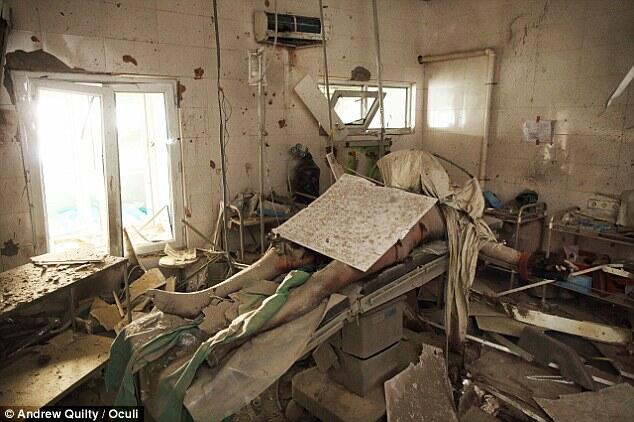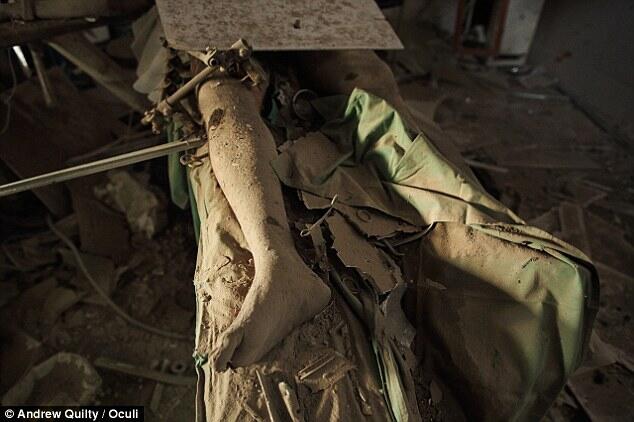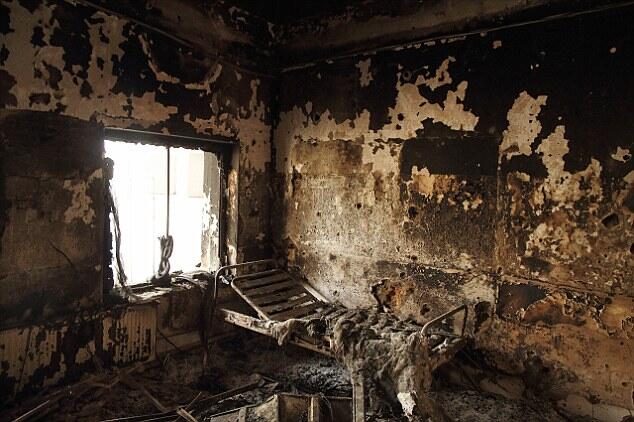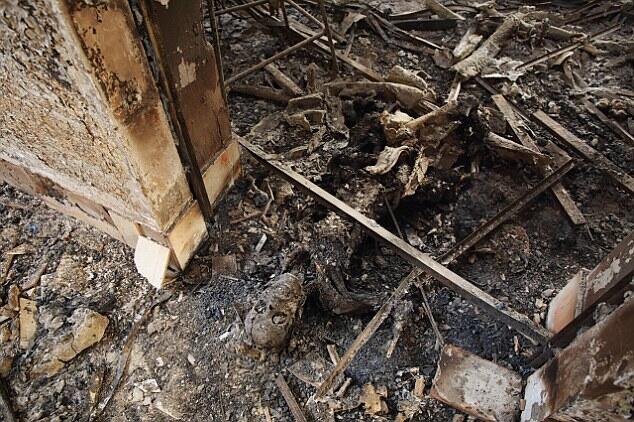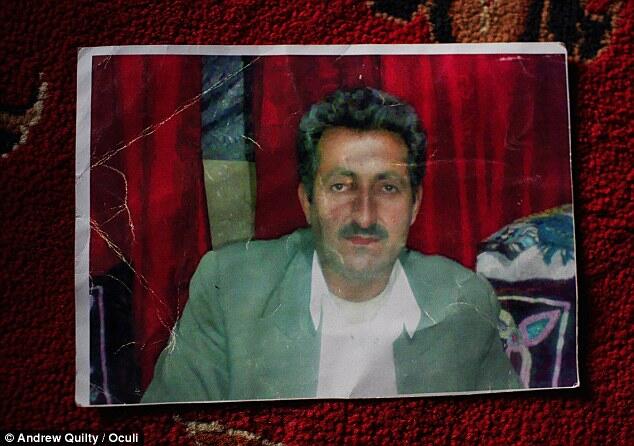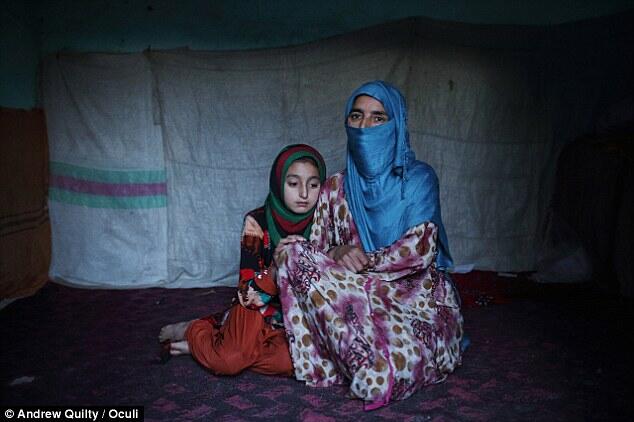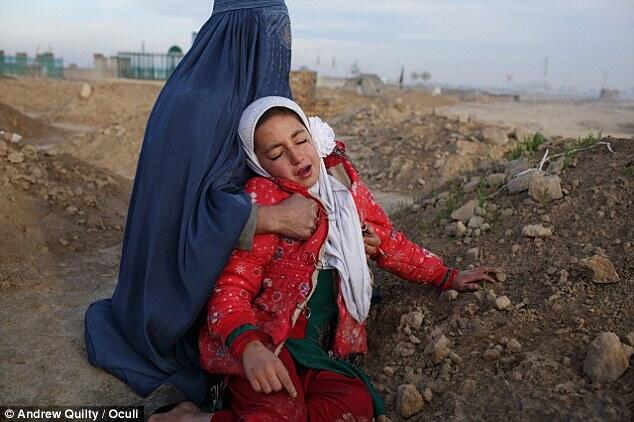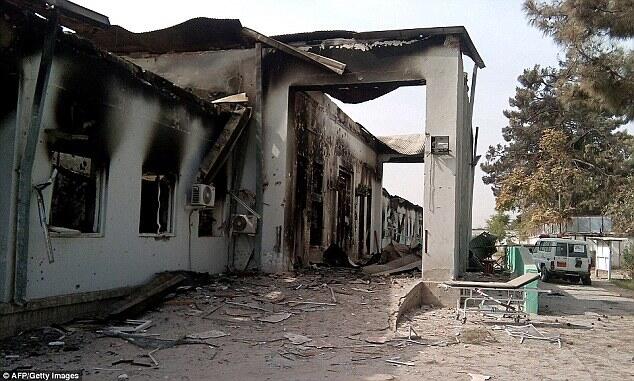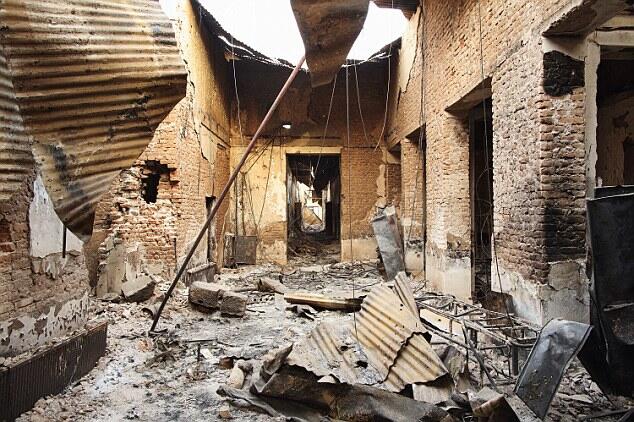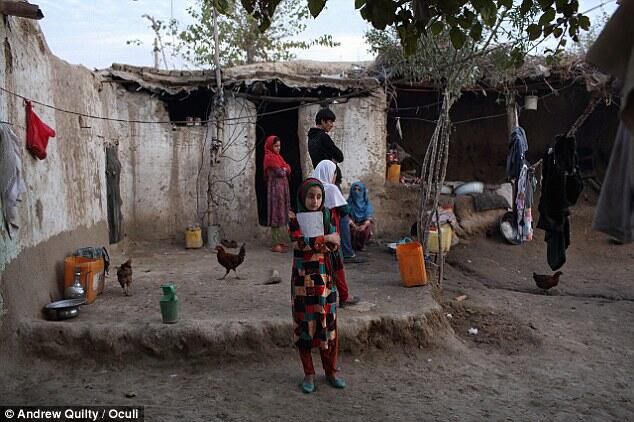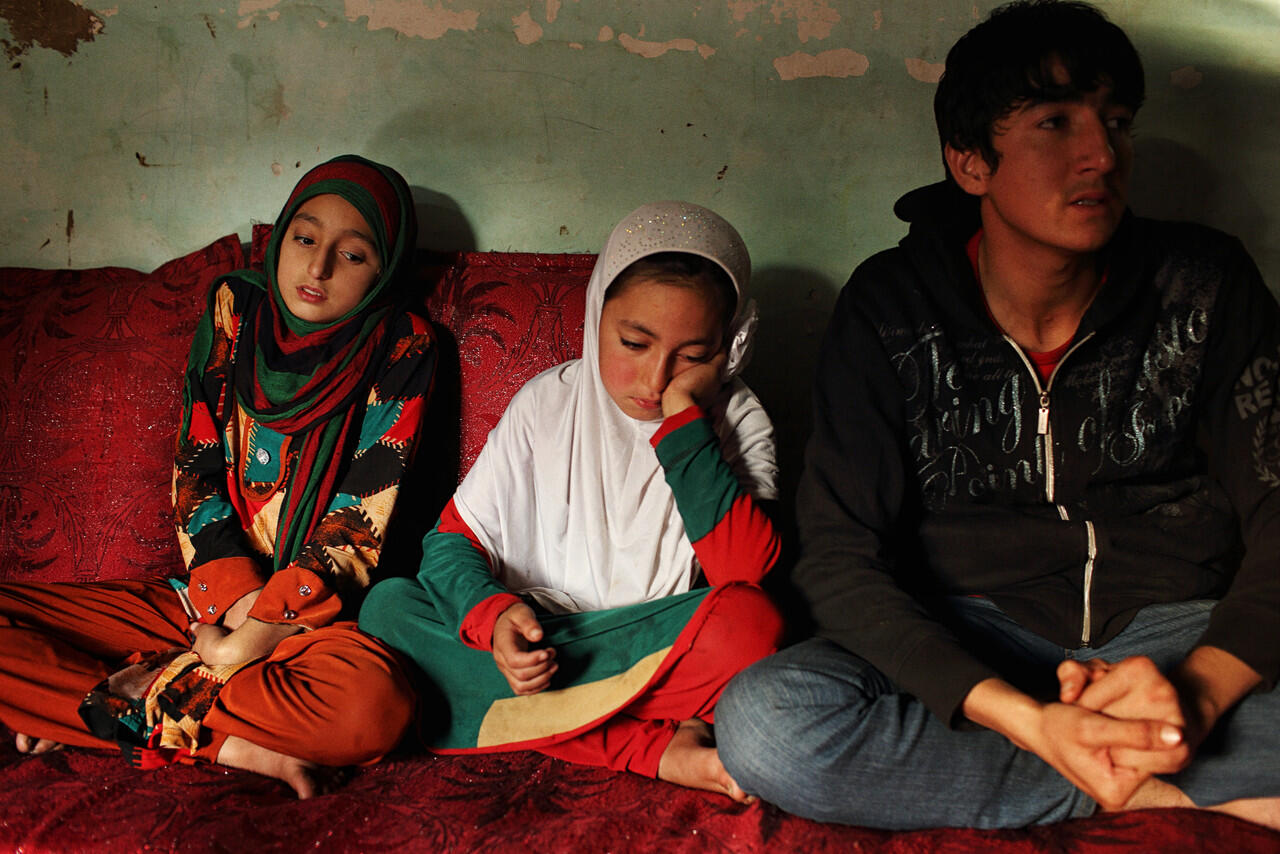- Beranda
- Komunitas
- News
- Berita Luar Negeri
Tragedy of Afgan Father Who Died in US Airstrike
TS
gruyere
Tragedy of Afgan Father Who Died in US Airstrike
It was bad luck that Baynazar Mohammad Nazar was even in the hospital in the first place.
For the second time in a few days that the father-of-four had been in wrong place at the wrong time.
He would never have been in the operating theatre had he not been shot in the thigh, caught in crossfire between Taliban and government forces as he left his home for a short time to buy bread from the shop for his family.
But he had, and the bullet which had torn through his leg left him needing surgery.
So, as the first shells sent debris flying across the room, Baynazar, 43, was not at home with his family as he should have been, but on the operating table, unconscious, strapped down and unable to flee with the others, the surgeons and nurses treating him, who ran for their lives.
By the time the photographer stumbled across the body, Baynazar had been dead for week, left behind in the burnt out hospital as intense fighting continued outside.
It took Andrew Quilty's eyes a second to register just what he was seeing, trapped under the fallen rubble in the abandoned hospital.
'I was pretty stunned - it was like a physical shock, like someone had come up behind me,' he told MailOnline.
The Australian photojournalist had travelled to Kunduz, 200 miles north of the capital Kabul, exactly seven days after the attack on the Medicins sans Frontieres' trauma facility.
It was razed to the ground by the Americans in the early hours of October 3, killing 42 patients and staff in a raid which those who survived say lasted almost an hour.
The majority of the hospital had been destroyed by fire. The bodies which remained were little more than charred skeletons, lying in amongst the twisted bed frames, charred rubble and shattered glass.
But this room was different: this particular wing of the hospital had not been as badly damaged by fire - which meant Baynazar still looked like the father-of-four who had been admitted to the hospital on October 1, despite most of his head having been sheered off.
'It was certainly the only body that was still recognisable,' Andrew said. 'The others had been burnt beyond recognition.'
When Andrew looked through the pictures later that evening, it was Baynazar who caught his attention again.
'I really just wanted to piece together the final days of his life. Not only that, but find out who had he left behind, how his death had affected those around him,' he explained.
It would take another four weeks to find Baynazar's family and discover his story - one which is repeated across Afghanistan and war zones around the world, the innocent bystander caught in the turmoil of war, and those they leave behind.
Baynazar and his family - wife Najibah and children Samiullah, 19, Raiana, 10, Zahra, eight, and Khalid, six - lived in a mud brick hut on the outskirts of Kundduz.
The family struggled financially using Baynazar's wages as a security guard for a nearby bazaar, where he worked nights.
When the Taliban reached the city limits on September 28 after a summer of fighting, Baynazar and his family, unlike many of their neighbours, decided to stay behind and protect what they had.
On October 1, Baynazar took the fateful decision to venture out to check on the shops he guarded, and to pick up bread for the family. But he was unable to reach the bazaar, and was turned back by Taliban fighters.
Moments later, a fire fight broke out, and Baynazar was shot in the thigh. His friend took him to hospital, where he underwent surgery to stop the bleeding.
But he needed more, and because the hospital being especially busy due to the battles outside, it was scheduled for the next evening.
Before he went in, he comforted Najibah. 'It's just bad luck,' he told her.
Hours later, he was dead.
But Nabiijah did not hear about the bombing until she was walking to visit Baynazar the next day. Shocked, she returned to the hospital accompanied by her youngest son, and searched through the burnt out shell to find her beloved husband, without any luck.
Five weeks later, when Andrew went to visit the family, they were still trying to come to terms with his death.
'I had no idea what I was going to find when I started searching,' he said. 'He could have been a Taliban fighter, he could have been an Afghan soldier.
'Given his age and physical stature, it was very possible. Then I discovered he was neither, he had a young family. It was quite a shock - I found it quite affecting.'
Khalid, he says, still doesn't seem to be quite sure what had happened. The older girls knew what they had lost, however.
Andrew said: 'They were incredibly sad - their faces were drawn, they were tired. Visiting Baynazar's grave Zahra was completely overwhelmed, desperate for her father.
'She was clawing at the grave, almost as if to dig him up and bring him home.'
Their grief is not the worst of their problems, however. The modest home - just two bedrooms, and without electricity - costs $50 a month, which Baynazar earned.
Now, there is no money - and Nabijah is unlikely to be able to go out and earn a salary to pay to feed, clothe and shelter her children.
'Afghanistan is notoriously difficult for widows,' Andrew explained. 'It is not culturally acceptable for women to work.'
So the responsibility will inevitably fall on the children.
Samiullah had dreamed of university, but this seems a far-off dream now. The younger children are in school, but they may be needed to help make ends meet, says Andrew.
'They might be forced to work on the streets, cleaning cars, or collecting scrap metal,' he said.
The family aren't the only ones feeling the impact of Baynazar's death: Andrew also tracked down the doctors who had been making the final sutures on his thigh as the bombs began to fall.
The experience had been terrifying, made worse by their guilt over the man they left behind.
'They were horrified to have been put int he position where they had to abandon a patient on the table,' said Andrew. 'They had no other choice. They were in such imminent danger.
'But they were still struggling with that.'
Baynazar wasn't the only person they lost that night. They also lost friends and colleagues in the bombing. In total, 14 MSF staff, 24 patients and four caretakers were killed - many burned alive in their beds, others decapitated, while some of those escaping the building were shot as 211 shells hit the building in quick succession.
The U.S. admitted responsibility for the devastating airstrike. Calling it a “tragic mistake,”
The top American commander in Afghanistan, General John Campbell concluded that “avoidable human error” was to blame, compounded by technical, mechanical and procedural failures.
At the time, they believed the hospital was being used by a Pakistani operative to coordinate Taliban activity but it is unclear whether the commanders who attacked it with an AC-130 gunship knew about the alleged enemy activity or whether it was a hospital.
U.S. officials claim they stopped after 29 minutes - half the time those inside the hospital said it took - when the frantic phone calls being made by MSF staff to officials finally reached the ears of those in charge.
Medicins sans Frontieres are still calling for an independent investigation into exactly what happened on October 3.
It was, in their eyes, and the eyes of many others, a 'war crime'.
But for Andrew, the bombing served to highlight the cost of wars waged from the sky.
'We hear a lot about drone strikes, or aerial attacks, but it is very hard to personalise the victims, many of whom are often innocent people,' he said.
'I felt there was some weight of responsibility to get as much out about their lives. I chased and I chased this man in particular.
'It was so stark. He was is such a vulnerable position on the operating table, a place where you would expect to be safe.'
A fundraising page was set up to help Baynazar's family - and hopefully allow Samiullah to go to university - https://fundrazr.com/campaigns/f1535...=share__35MT8c
Summary:
Baynazar Mohammad Nazar, 43, was a security guard who lived in Kunduz, Afghanistan, with wife and four children
On October 1, he went to shop for bread and was shot in the leg in fighting between Taliban and government forces
Baynazar was taken to a Medicins sans Frontieres hospital in Kunduz where surgeons operated to remove the bullet
But while he was under general anaesthetic, the hospital was bombed in a U.S. airstrike, killing 42 people inside
Photojournalist Andrew Quilty went to the bombed out shell a week later and found Baynazar on the operating table
Discovery led Quilty to track down the father-of-four's devastated family to their mud brick home to hear his story
By FLORA DRURY FOR MAILONLINE
PUBLISHED: 11:18 GMT, 24 December 2015 | UPDATED: 01:54 GMT, 25 December 2015
Published by Associated Newspapers Ltd
Part of the Daily Mail, The Mail on Sunday & Metro Media Group
This is the reality of war,unlike in the movies, this is what actually happens to all those involved, the mistakes of the aggressor and the misfortune of the aggrevived
For the second time in a few days that the father-of-four had been in wrong place at the wrong time.
He would never have been in the operating theatre had he not been shot in the thigh, caught in crossfire between Taliban and government forces as he left his home for a short time to buy bread from the shop for his family.
Spoiler for WARNING GRAPHIC CONTENT!:
Spoiler for WARNING GRAPHIC CONTENT!:
But he had, and the bullet which had torn through his leg left him needing surgery.
So, as the first shells sent debris flying across the room, Baynazar, 43, was not at home with his family as he should have been, but on the operating table, unconscious, strapped down and unable to flee with the others, the surgeons and nurses treating him, who ran for their lives.
By the time the photographer stumbled across the body, Baynazar had been dead for week, left behind in the burnt out hospital as intense fighting continued outside.
It took Andrew Quilty's eyes a second to register just what he was seeing, trapped under the fallen rubble in the abandoned hospital.
'I was pretty stunned - it was like a physical shock, like someone had come up behind me,' he told MailOnline.
Spoiler for Destroyed Hospital:
Spoiler for Another Victim:
The Australian photojournalist had travelled to Kunduz, 200 miles north of the capital Kabul, exactly seven days after the attack on the Medicins sans Frontieres' trauma facility.
It was razed to the ground by the Americans in the early hours of October 3, killing 42 patients and staff in a raid which those who survived say lasted almost an hour.
The majority of the hospital had been destroyed by fire. The bodies which remained were little more than charred skeletons, lying in amongst the twisted bed frames, charred rubble and shattered glass.
But this room was different: this particular wing of the hospital had not been as badly damaged by fire - which meant Baynazar still looked like the father-of-four who had been admitted to the hospital on October 1, despite most of his head having been sheered off.
'It was certainly the only body that was still recognisable,' Andrew said. 'The others had been burnt beyond recognition.'
When Andrew looked through the pictures later that evening, it was Baynazar who caught his attention again.
'I really just wanted to piece together the final days of his life. Not only that, but find out who had he left behind, how his death had affected those around him,' he explained.
It would take another four weeks to find Baynazar's family and discover his story - one which is repeated across Afghanistan and war zones around the world, the innocent bystander caught in the turmoil of war, and those they leave behind.
Baynazar and his family - wife Najibah and children Samiullah, 19, Raiana, 10, Zahra, eight, and Khalid, six - lived in a mud brick hut on the outskirts of Kundduz.
The family struggled financially using Baynazar's wages as a security guard for a nearby bazaar, where he worked nights.
When the Taliban reached the city limits on September 28 after a summer of fighting, Baynazar and his family, unlike many of their neighbours, decided to stay behind and protect what they had.
On October 1, Baynazar took the fateful decision to venture out to check on the shops he guarded, and to pick up bread for the family. But he was unable to reach the bazaar, and was turned back by Taliban fighters.
Moments later, a fire fight broke out, and Baynazar was shot in the thigh. His friend took him to hospital, where he underwent surgery to stop the bleeding.
But he needed more, and because the hospital being especially busy due to the battles outside, it was scheduled for the next evening.
Before he went in, he comforted Najibah. 'It's just bad luck,' he told her.
Hours later, he was dead.
But Nabiijah did not hear about the bombing until she was walking to visit Baynazar the next day. Shocked, she returned to the hospital accompanied by her youngest son, and searched through the burnt out shell to find her beloved husband, without any luck.
Five weeks later, when Andrew went to visit the family, they were still trying to come to terms with his death.
Spoiler for Baynazar Mohammad Nazar, 43:
Spoiler for Najibah a widow and Raiana:
Spoiler for Bad luck: Baynazar got caught in the crossfire between the Taliban and government forces, getting shot in the thigh. He needed an operation to close the wound at the hospital. His family expected him to return, and not for Zahra to be left clawing at his grave
:
'I had no idea what I was going to find when I started searching,' he said. 'He could have been a Taliban fighter, he could have been an Afghan soldier.
'Given his age and physical stature, it was very possible. Then I discovered he was neither, he had a young family. It was quite a shock - I found it quite affecting.'
Khalid, he says, still doesn't seem to be quite sure what had happened. The older girls knew what they had lost, however.
Andrew said: 'They were incredibly sad - their faces were drawn, they were tired. Visiting Baynazar's grave Zahra was completely overwhelmed, desperate for her father.
'She was clawing at the grave, almost as if to dig him up and bring him home.'
Their grief is not the worst of their problems, however. The modest home - just two bedrooms, and without electricity - costs $50 a month, which Baynazar earned.
Now, there is no money - and Nabijah is unlikely to be able to go out and earn a salary to pay to feed, clothe and shelter her children.
'Afghanistan is notoriously difficult for widows,' Andrew explained. 'It is not culturally acceptable for women to work.'
So the responsibility will inevitably fall on the children.
Samiullah had dreamed of university, but this seems a far-off dream now. The younger children are in school, but they may be needed to help make ends meet, says Andrew.
'They might be forced to work on the streets, cleaning cars, or collecting scrap metal,' he said.
Spoiler for Hospital's Debris :
Spoiler for Hospital's Debris:
The family aren't the only ones feeling the impact of Baynazar's death: Andrew also tracked down the doctors who had been making the final sutures on his thigh as the bombs began to fall.
The experience had been terrifying, made worse by their guilt over the man they left behind.
'They were horrified to have been put int he position where they had to abandon a patient on the table,' said Andrew. 'They had no other choice. They were in such imminent danger.
'But they were still struggling with that.'
Baynazar wasn't the only person they lost that night. They also lost friends and colleagues in the bombing. In total, 14 MSF staff, 24 patients and four caretakers were killed - many burned alive in their beds, others decapitated, while some of those escaping the building were shot as 211 shells hit the building in quick succession.
The U.S. admitted responsibility for the devastating airstrike. Calling it a “tragic mistake,”
The top American commander in Afghanistan, General John Campbell concluded that “avoidable human error” was to blame, compounded by technical, mechanical and procedural failures.
At the time, they believed the hospital was being used by a Pakistani operative to coordinate Taliban activity but it is unclear whether the commanders who attacked it with an AC-130 gunship knew about the alleged enemy activity or whether it was a hospital.
U.S. officials claim they stopped after 29 minutes - half the time those inside the hospital said it took - when the frantic phone calls being made by MSF staff to officials finally reached the ears of those in charge.
Medicins sans Frontieres are still calling for an independent investigation into exactly what happened on October 3.
It was, in their eyes, and the eyes of many others, a 'war crime'.
But for Andrew, the bombing served to highlight the cost of wars waged from the sky.
'We hear a lot about drone strikes, or aerial attacks, but it is very hard to personalise the victims, many of whom are often innocent people,' he said.
'I felt there was some weight of responsibility to get as much out about their lives. I chased and I chased this man in particular.
'It was so stark. He was is such a vulnerable position on the operating table, a place where you would expect to be safe.'
A fundraising page was set up to help Baynazar's family - and hopefully allow Samiullah to go to university - https://fundrazr.com/campaigns/f1535...=share__35MT8c
Spoiler for Victim's family :
Spoiler for Victim's family:
Summary:
Baynazar Mohammad Nazar, 43, was a security guard who lived in Kunduz, Afghanistan, with wife and four children
On October 1, he went to shop for bread and was shot in the leg in fighting between Taliban and government forces
Baynazar was taken to a Medicins sans Frontieres hospital in Kunduz where surgeons operated to remove the bullet
But while he was under general anaesthetic, the hospital was bombed in a U.S. airstrike, killing 42 people inside
Photojournalist Andrew Quilty went to the bombed out shell a week later and found Baynazar on the operating table
Discovery led Quilty to track down the father-of-four's devastated family to their mud brick home to hear his story
By FLORA DRURY FOR MAILONLINE
PUBLISHED: 11:18 GMT, 24 December 2015 | UPDATED: 01:54 GMT, 25 December 2015
Published by Associated Newspapers Ltd
Part of the Daily Mail, The Mail on Sunday & Metro Media Group
This is the reality of war,unlike in the movies, this is what actually happens to all those involved, the mistakes of the aggressor and the misfortune of the aggrevived
0
1.4K
0
Komentar yang asik ya
Komentar yang asik ya
Komunitas Pilihan
